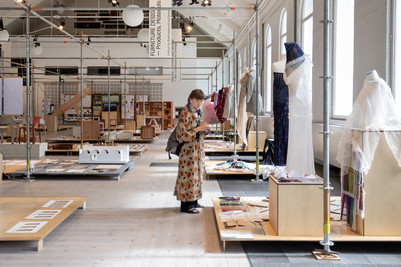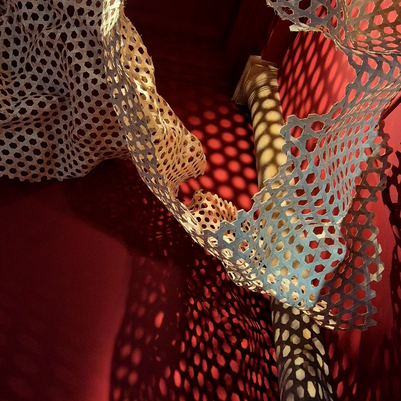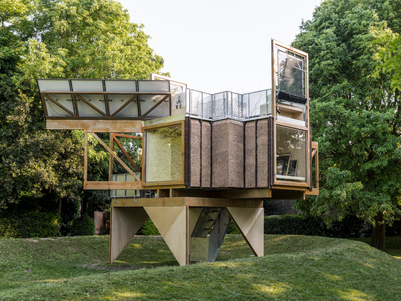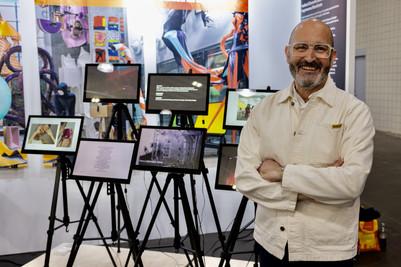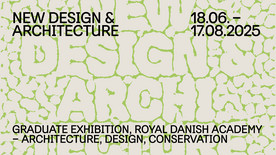
Course program 2025
The PhD School offers courses within the fields of architecture, design, and preservation. Additionally, the PhD School offers generic classes for all PhD students.
All PhD students enrolled in a doctoral degree-awarding institution in Denmark can sign up for PhD courses at the PhD School for free. However, there might be restrictions on the number of participants in each class. PhD students enrolled in an institution outside of Denmark must pay a tuition fee of 1200 DKK per ECTS point.
A Guide to a Successful PhD Thesis: A Holistic Approach to Structuring, Conducting, and Completing Your PhD
A Guide to a Successful PhD Thesis: A Holistic Approach to Structuring, Conducting, and Completing Your PhD
Language
English
Coordinator(s)
Dr. Emanuele Naboni (Adjunct Professor at the Royal Danish Academy, Contracted Professor at University of South Wales (Sydney), UC Berkeley, Norman Foster Academy, School of Sustainability).
Course description
This course, taught in 12 universities in different countries and taught to more than 300 PhD students, aims to support Ph.D. students wishing to conduct design research and enter the academic world. The objectives of the course are four:
1) to understand the academic world coordinates
2) to grant breadth, fostering the development of a Ph.D. thesis Structure and other academic essays
3) to give depth to research work by converging on the development of a solid methodology and customized Research Methods (primarily for Architecture and Design but applicable to Scientific Disciplines)
4) to address all the aspects of the Management of a Thesis and relations to stakeholders
From the introduction to conclusions, producing a Thesis Structure is a further challenge: the course, uniquely based on participants' thesis work, proposes a step-by-step guide to devising a Structure that strengths Parts and Chapters organization and connections. Either Ph.D. researchers have just started their Ph.D. or are closing it; each participant will grasp the essential, iterative process by which research questions generate Knowledge.
Critical to the Process is the vast range of Research Methods suitable for the diverse array of topics germane to Design Research (e.g. research by Design, Qualitative Research design, Correlational, Experimental, Simulation, Case Studies). When logical, participants will seek ways to marshal the benefits of two or more Research Methods applied to their investigations to build a solid Methodology.
Weaved with Structure and Methods is the “Thesis Management.” Here, a high emphasis is placed on the "adventure" of being a research student. How to get started, get through revisions, face deadlines, and regulate the workload is addressed. The full potential of working with supervisors, the varied stakeholders (comprising industrial Ph.Ds), academic peers, and final examiners is treated. The topic of dissemination along and after the Ph.D. is also debated.
The course offers a cohesive approach that will help PhD students succeed in their academic path.
Dates
3rd-7th of February
Calendar:
Monday
9 AM to 12 PM: Introduction to the academic world, key academic terms, structuring the thesis and its components, and focus on the Introduction and Research Goals.
Afternoon: Individual work
Tuesday
9 AM to 12 PM: Detailed examination of your thesis' core and synthesis. Principles of good academic writing and a guide to scientific production during the PhD.
Afternoon: Individual work
Wednesday
9 AM to 12 PM: Methodology - emphasizing the development of original research methods.
Afternoon: Individual work
Thursday
9 AM to 12 PM: Writing, viva, and attributes of a successful thesis. Other academic activities alongside the PhD. Time and energy management. Managing relationships with thesis stakeholders.
Afternoon: Individual work
Friday
9 AM to 12 PM: Presentation and final debates on PhD structure and Table of Contents.
Min. and max participants
Min 6 max 12 or 14
ECTS
4
Application deadline
15th of January 2025 via https://katalog.kglakademi.dk/phdtilmeld.php
Academic Writing Workshop - Writing an Article
Academic Writing Workshop - Writing an Article
Language
English
Coordinator
Anna-Vera Meidell Sigsgaard, Ph.D.
Course description
The aim of this workshop is to introduce participants to aspects of academic writing when writing academic journal articles in English. In this workshop we will pay attention to genre and function as well as some aspects of written language. The workshop also provides structured time for participants to work on their own writing; this means participants must bring a draft of their own writing to work on during the workshop.
Throughout the workshop, participants will be introduced to generic structures of academic articles, to the function of each section of academic articles and to prominent language features. The focus of the workshop is on academic journal articles; however, it can also be useful for participants working on other kinds of academic writing, such as abstracts, conference papers, monographs, and literature reviews. These are not, however, the specific focus of this workshop.
The course incorporates a variety of instructional activities including instructor presentations, structured pair exercises, group work, as well as time for individual writing on participants’ own drafts. Typically, the instructor will introduce participants to a specific generic or language feature (or group of features), ask participants to complete related exercises that highlight this feature, then provide structured writing time for participants to work on these aspects of their own texts.
The course will be taught in English; however, participants are welcome to ask questions and do group work in Danish.
Prerequisites
In order to participate in the workshop, participants must bring a draft of the article they wish to work on during the workshop. Participants should at least have started the writing process on an article (or if need be, a chapter in their monograph). In other words, participants should have an idea about the article’s main idea/contribution, an outline for the article as well as several paragraphs of text to work with during the three days of the workshop.
The course works best if you have a draft of an article (at least a few pages of text from several sections – i.e. Intro, analysis, discussion) that you can work with, as these will be the basis for your revision/writing exercises. Time will be made available each day to revise, write and edit your article draft during the workshop with sparring/feedback from the other participants and from the instructor.
Participants are expected to have a working level of written English language skills at the tertiary level. This workshop focuses on genre-specific language patterns and conventions in academic writing and is not a language/grammar course.
Course content
The workshop will cover the following topics, prioritized depending on participant needs:
- Text structure at the whole-text, paragraph, and clause levels
- Genre and text style in articles and papers
- How to connect theory with data in writing (especially in your analysis/discussion)
- Moving from more spoken-like to more written-like, academic language
- Text density and clarity
Dates
11th-13th of June
Calendar
The following is a preliminary program; content may be adjusted prior to and during the workshop based on participant levels. Adjustments may also be made underway, depending on participant requests.
Wednesday, 10:30 to 15:30
- Introduction
- Your Academic Writing Profile and purpose for writing
- The Structure of an academic article (at the whole-text level)
- Thematic structures at the whole-text level
- What is a paragraph (and paragraph structures)
Thursday, 09:00 to 15:00
- Stages in the introduction
- Referring to other people’s work
- Structure at the clause-level (Theme-Rheme)
- Transitions and transitional devices
Friday, 09:00 to 15:00
- Coherence and cohesion (making sure your sentences fit together)
- Constructing findings: connecting your data (what we see) with theory (what we know) in your analysis
- Making your language more written like
- looking at noun- groups and nominalizations
ECTS
3
Application deadline
9th of May 2025 via https://katalog.kglakademi.dk/phdtilmeld.php
Introduction to Academic Practices
Introduction to Academic Practices
Language
English
Coordinator
Dag Petersson
Course description
Through this course, students obtain insights in the fundamentals of academic research practices. Particular focus is on crafting a proper academic object, formulating a good problem statement, structuring one’s data collection, and getting a first grasp on method, theory and analysis. This introduction is primarily for PhD-students from the art, architecture, and design schools, aiming particularly at those who are in the early phases of their projects Teaching is based on the participants’ individual project descriptions. No previous experience with academic production is expected. The goal is to critically identify each project’s inherent academic requirements and preferred strategy, and to help students meet the established academic criteria and standards from early on.
Participants should upload/submit their full PhD project description and project plan ahead.
Dates
13th-17th of January 2025
Venue
Esplanaden
ECTS
3
Application deadline
20th of December 2024
Artificial Intelligence in architectural and design research
Artificial Intelligence in architectural and design research
Language
English (or Danish if only Danish speaking students)
Coodinator
Anders Hermund
Other lecturers
Henrik Oxvig and Jacob Bang + invited key note lecturers
Course description
The course introduces artificial intelligence in research as a potential player in the creative process. We look at A.I. text generation tools and Machine Learning where A.I. text-to-image generation is used as a possible inspiration to get started with studies of moods, spatiality and to support a reflection on the architectural vision and narratives in architecture projects. A research project in Tanzania using remote sensing and machine learning artificial intelligence will also be introduced as a case study.
We will combine philosophical, artistic, and scientific approaches in order to discuss the potentials and the potential dangers by A.I. as an instrument or agent in our daily work with art and research, and the big questions of modern society. During the course we will have reflections and discussions based on presentations from the lecturers and a reader comprising texts from Plato, Heidegger, Deleuze to modern tech philosophers like Kevin Kelly and Jaron Lanier. We will also hands-on introduce and use A.I. tools during the course to produce material for discussion in relation to research, art, and scientific work in the individual PhD projects.
Dates
Course will be one week, with presentations Monday, Wednesday, and Friday.
24-28th of February, 2025
Venue
Royal Danish Academy
ECTS
3
Application deadline
17th of December 2024 via https://katalog.kglakademi.dk/phdtilmeld.php
The Library's Course for ph.d.-students: Academic Toolbox: Search, Cite, Sort and Share - Spring
The Library's Course for ph.d.-students: Academic Toolbox: Search, Cite, Sort and Share - Spring
Language and form
English/Danish. Lectures, exercises, and discussions
Course facilitators
Margrethe “Gæk” Bredahl – Librarian – mbre@kglakademi.dk
Søren Peter Mørch – Librarian – smor@kglakademi.dk
Silja Attrup – Librarian – satt@kglakademi.dk
Course description
This course is specifically aimed at PhD students in the beginning of their writing process. The course will consist of a mix of lectures, discussions, and exercises. We encourage you to share your knowledge and experiences during the course.
Part 1: Information search in specialized databases and the open web. The first part of this course will enable you to conduct advanced academic information searches. We will explore the search process from defining a strategy to evaluating and documenting your search results. You will learn how to carry out comprehensive literature searches based on your own research assignment. We will guide you through the various information seeking steps from selecting relevant search strategies and techniques to evaluating your search results.
- Evaluate databases and other information resources
- Set up search strategies and use various search techniques
- Identify relevant types of information resources
Part 2: Reference management, citations, and bibliography. The second part of the course will teach you how to use a reference management tool to keep track of the literature and other sources you need for your research and how to use the tools to manage and overlook your research process.
- Introduction to Zotero – please install one before the course : zotero.org
- How to autogenerate citations and bibliography entries in various styles as part of your search- and writing process
Part 3: Personal Knowledge Management. We introduce the student to various methods and tools to organize all the information and data types they deal with within their three years of study.
Part 4: Publishing and sharing your research. This third part of the course will introduce you to the publishing workflow, Open Access, the PURE portal, and other aspects of the research cycle.
- Open Access and copyright-negotiation with publishers
- How to register your research and CV in our PURE research portal
- Introduction to the publication workflow and platforms for Academic exposure and findability such as ORCID
ECTS
1
Dates
11th and 12th of March 2025 - both days from 9:00 to 15.00 with an one-hour lunch break.
Application deadline
10th of January 2025 via https://katalog.kglakademi.dk/phdtilmeld.php
The Library's Course for ph.d.-students: Academic Toolbox: Search, Cite, Sort and Share - Autumn
The Library's Course for ph.d.-students: Academic Toolbox: Search, Cite, Sort and Share - Autumn
Language and form
English - Lectures, exercises, discussions
Course facilitators
Margrethe “Gæk” Bredahl – Librarian – mbre@kglakademi.dk
Søren Peter Mørch – Librarian – smor@kglakademi.dk
Silja Attrup – Librarian – satt@kglakademi.dk
Course description
This course is specifically aimed at PhD students at the beginning of their project. The course will consist of a mix of lectures, discussions, and exercises. We encourage you to share your knowledge and experiences during the course.
Part 1: Information search in specialized databases and the open web. The first part of this course will enable you to conduct advanced academic information searches. We will explore the search process from defining a strategy to evaluating and documenting your search results. You will learn how to carry out comprehensive literature searches based on your own research assignment. We will guide you through the various information seeking steps, from selecting relevant search strategies and techniques to evaluating your search results.
- Evaluate databases and other information resources
- Set up search strategies and use various search techniques
- Identify relevant types of information resources
Part 2: Reference management, citations, and bibliography. The second part of the course will teach you how to use a reference management tool to keep track of the literature and other sources you need for your research and how to use the tools to manage and overlook your research process.
- Introduction to Zotero – please install one before the course: zotero.org
- How to autogenerate citations and bibliography entries in various styles as part of your search and writing process
Part 3: Publishing and sharing your research. This third part of the course will introduce you to the publishing workflow, Open Access, registrations in Pure, and other aspects of the research cycle.
- Open Access and copyright-negotiation with publishers
- How to register your research and CV in our PURE research portal
- Introduction to the publication workflow and platforms for Academic exposure and findability such as ORCID
ECTS
1
Dates
29th and 30 of October 2025 - both days from 9:00 to 15.00 with a one-hour lunch break.
The course will take place in the Library at Holmen.
Application deadline
29th of August 2025 via https://katalog.kglakademi.dk/phdtilmeld.php
Maximum number of participants: 10
Ph.D. students enrolled at either the Royal Academy, Aarhus School of Architecture or Design School Kolding are welcome to attend the course.
Material Studies in Architecture and Design
Material Studies in Architecture and Design
Language
English
Coordinators
Isak Worre Foged & Phil Ayres
Other lecturers
TBA
Course description
Materials are an embedded part of design thinking, design experiments and design making, both in academia and industry. They also form a central leverage point in the transition to a sustainable society, and a core aspect of how we develop experiential phenomena for our design targets.
We engage with materials constantly, but how do we study materials, material processes and material representations in design led research?
This course focuses on illustrating and debating research strategies and methods for material studies in architecture and design. This implicates the forming of a dual research platform of both quantitative and qualitative investigations that enable new insights across the design scales.
The course is structured around 2 activities: An initiating 2-Day seminar, where invited speakers and participating PhD students will present and discuss research approaches. This is followed by a 2-Day workshop on how to advance the methodological approaches of the student specific projects.
Dates
Seminar: 19th-20th of March
Workshop: 9th-10th of April
Venue
Holmen
ECTS
3
Application deadline
15 February 2025 via https://katalog.kglakademi.dk/phdtilmeld.php
Experiments in research through design: framing, making and learning
Experiments in research through design: framing, making and learning
Language
English
Coodinator
Sissel Olander
Other lecturers
TBA
Course description
The choice of PhD research methodology or approach(es) largely influences the results and arguments one is able to make. Within design research, during the last decades research-through-design (Frayling 1993) or more broadly practice-based approaches have been emphasized and richly elaborated. The course has a special focus on research programs and how practices of making – often described and considered as experiments – play a core role in the
development of new knowledge. During this PhD course we will give an overview of these different developments and characteristics of research-through-design - especially in a Scandinavian perspective. The course is comprised of a two-day Symposium followed by a later two/three-day Seminar. The Symposium includes: Lecturers introducing and engaging in dialogue about different perspectives on and characteristics of research-through-design – with special focus on ‘research programs’ and experiments; smaller reflective exercises and a hands-on workshop / meta-experiment to assist the participating PhD scholars in elaborating their own approach and position in relation to parts of the course literature. The later Seminar includes: group analysis, discussion and presentation – in a methodological perspective - of a collection of research-through-design PhD dissertations. Additionally, the participating Ph.d. scholars will present their own position in terms of research approach(es) and roles of the practical work, and will give and get verbal individual feedback from staff and one other student. Preparation prior to the Symposium and the Seminar will be rather substantial in terms of readings. A compendium of texts will be provided as well as examples of practice-based PhD dissertations. Each student is to read one of these dissertations intentionally matching the student’s research interests. Preparation for the Seminar also includes individually making a theoretically and practically grounded presentation of one’s own research methodology / approach(es) and giving feedback to one other student.
Dates
Symposium 26th and 27th of May
Seminar 14th and 15th of August
ECTS
5
Application deadline
26th of March via https://katalog.kglakademi.dk/phdtilmeld.php
Videnskabelig artikelskrivning
Videnskabelig artikelskrivning
Sprog
Dansk (engelsk hvis nødvendigt)
Ansvarlige
Arne Redsted Rasmussen & Morten Ryhl-Svendsen
Kursusbeskrivelse
Kurset er en introduktion til arbejdsgangen omkring skrivning og publicering af artikler til videnskabelige tidsskrifter. Deltagerne vil stifte kendskab til forskellige artikeltyper, peer-review systemet, og få præsenteret eksempler på videnskabelige publikationer.
Introduktion til den videnskabelige artikels enkeltdele gives ved klasseundervisning. Der vil indgå en stor andel af selvstudie og selvstændigt arbejde, herunder udarbejdelse af et manuskript til en artikel, efter eget emnevalg, til intern fremlæggelse og kritik på modulet. Dette vil kræve forberedelse på ca. 5 timer per undervisningstime.
- Pensum: Gastel, B. & Day, R.A.: “How to Write and Publish a Scientific Paper” (9th Ed.), Santa Barbara: Greenwood, 2022.
Datoer
D. 11., 18., 25. september og d. 2. og 9. oktober.
Lokalitet
Holmen
ECTS
5
Tilmeldingsfrist
18. juli 2025 via https://katalog.kglakademi.dk/phdtilmeld.php
The more-than-human in urban planning
The more-than-human in urban planning
Language
English
Coordinator
Gustavo Ribeiro, Associate Professor, Royal Danish Academy - Institute of Architecture, Urbanism and Landscape
Other lecturers
Matthew Gandy (to be confirmed). Professor of Cultural and Historical Geography, Cambridge University
Jonna Majgaard Krarup – Professor, Royal Danish Academy - Institute of Architecture, Urbanism and Landscape
Course description
The challenges posed by the climate and biodiversity crises have given rise to an urgent need to rethink urban planning theory and practice.
There has been an increasing focus in urban studies, notably in the last decade, on the need for addressing the challenge of human exceptionalism in urban theory and practice. As several authors have pointed out, efforts to reconceive and retheorize urban planning in more-than-human terms as well as concrete endeavours to implement more-than-human approaches in planning practice face challenges and dilemmas (Houston et al. 2018), which permeate ideological and discursive practices as wells as concrete planning frameworks - legislation, projects, planning platforms, processes, amongst others.
In this course we will explore key theoretical and analytical work that engage in discussions of the inclusion of more-than-human perspectives in urban planning and how such perspectives may contribute to a reconfiguration of planning practice.
The course programme will consist of a masterclass (1 day) with an international expert/academic. We already have been in contact with Matthew Gandy concerning inviting him to lecture at the Royal Danish Academy and will invite him to contribute to deliver af master class. The remaining 4 days of the course will include lectures delivered by the course coordinator Gustavo Ribeiro (discussing the theme of the course in relation to key theoretical positions) as well as academic staff at IBBL doing research on the theme.
Students will be asked to do extensive reading prior to the beginning of the course. They will also be asked to prepare a 10-15 min. presentation concerning a reflection on the theme of the course and its relevance for their PhD work.
Dates
20th- 24th of October
Venue
Holmen
ECTS
3
Application deadline
1st of August via https://katalog.kglakademi.dk/phdtilmeld.php
Exploring New Materialism: Force
Exploring New Materialism: Force
Language
English
Coordinators
Henrik Oxvig, Associate Professor, Royal Danish Academy - Institute of Architecture, Urbanism and Landscape
Martin Søberg, Associate Professor, Royal Danish Academy - Institute of Architecture and Culture
Other lecturers
Ulrik Schmidt, Associate Professor, Roskilde University
The course is organised in collaboration with Roskilde University, Department of Communications and Arts.
Course description
Exploring New Materialism: Force explores the ideas of New Materialism and their implications for current theory, criticism and practice in the fields of architecture, design, art, the humanities and social sciences. The course pays special attention to the question of force and its potential for fostering ontological, epistemological and aesthetic considerations.
Inquiring into force is highly pertinent in the light of the climate and biodiversity crises as well as of contemporary challenges concerning democracy, sociopolitical conflict, vulnerability and global social stratification. But the question of force also points to fundamental questions concerning the operations of matter and the sociomaterial environment, for instance: energy and physical dynamics; matter and movement; violence, power, tension and aggression; material metamorphosis and transmutation; capture and emancipation; emergence and entropy; creation and destruction; images, imaginations and sensations of/as forces; life and death, etc.
The course investigates how attention to force vis-à-vis material conditions and conceptual perspectives can guide, challenge and stimulate theoretical and empirical studies of materiality and material artefacts. What are the implications of force for the ways we produce, perceive and conceptualize material objects and events and how we reflect on such processes?
Based on discussions of texts by thinkers such as Dipesh Chakrabarty, Karen Barad, Bruno Latour, Jane Bennett, Gilles Deleuze and Félix Guattari – plus an international guest lecture – the course focuses on the integration of ideas from or related to New Materialism into the student’s own research.
Dates
6th-7th of November, 20th-21st of November 2025, four all-day sessions including reading sessions, keynote lecture, presentations, and discussions.
Venue
Royal Danish Academy – Architecture, Design, Conservation
ECTS
3
Application deadline
6th of September via https://katalog.kglakademi.dk/phdtilmeld.php
Values, Norms and Biases in Design
Values, Norms and Biases in Design
Language
English
Coordinator
Kirsten Marie Raahauge
Other lecturers
Prof. Alison J Clarke, Vienna University of Applied Arts (master)
Associate prof. Masashi Kaijita
Associate prof. Ane Pilegaard
Course description
The course consists of three elements:
A one-day seminar with an excursion, small lectures, and debates, where all the teachers are involved.
A one-day study circle with presentations of texts by the students and discussions of themes and texts in plenum.
A one-day seminar with presentation of papers by the ph.d.-students, commented by Alison Clarke, and discussed by all the teachers, ending with a lecture by Alison Clarke
The making and shaping of the human environments are never value neutral. Shaping the life conditions for humans, design, architecture, and planning creates the material and spatial conditions under which humans re-reproduce values, norms, social relations and cultural contexts. To design something is to create the fertile grounds for human practices and activities; design both reflects and transforms its societal context. Either this relationship is overlooked, or it is simply presented as an a-priori positive relationship. Design and normativity are inseparable as are the positive and negative outcomes for humans within such frames.
The course has three levels: First, it offers an operational framing of critical-creative theories and concepts from the humanities, social sciences, and critical design thinking. Secondly, these are illustrated on cases drawn from the research of the lecturers and reaches across from design studies over interior and domestic design to questions of critical disability studies. Thirdly, the course also requires participants to present their research projects within the framing of ‘design and normativity’; they will be given detailed feedback from the lecturers.
Dates
26.11.-28.11.
Venue
Holmen
ECTS
4
Application deadline
31st August 2025, the course will be open for applications six months prior to the course date(s)
A paper of 1.000-1.500 words and an image should be submitted in RUM, deadline 10th of October. Papers and images should be addressing the theme of the course as well as the focus of the PhD-project. Length: 1.000-1.500 words + an image. One can apply via https://katalog.kglakademi.dk/phdtilmeld.php
Landskabsarkitektur Colloquium // Landscape Architectural Colloquium
Landskabsarkitektur Colloquium // Landscape Architectural Colloquium
Sprog // Language
Danish/English
Ansvarlig // Coordinator
Jonna Majgaard Krarup
Øvrige undervisere // Other lecturers
TBA
Kursusbeskrivelse // Course description
Discussions on nature and landscape fill the professional and the public debate – many ask themselves how to reconnect with nature, how to reestablish nature’s own balance, they explore and argue for nature-based solutions, and eco system services etc. An over-arching question concerns the human- non-human relation and how it is translated and negotiated and represented.
Seen from a professional landscape architectural perspective this interest is, on the one hand, very gratifying. On the other hand, the fact that the increased interest is related to global warming, resource exhaustion and biodiversity loss is discouraging.
Many of the questions are asked by researchers coming from other disciplines – for example philosophy, sociology, law, and biology, but touch upon and have relevance for landscape architectural, spatial, and aesthetic and ethical aspects.
The questions also offer the opportunity for the landscape architectural discipline to re-visit and possible to re-connect with its theoretical and methodological legacy, and to re-position itself in an even wider and/or better(?) disciplinary context and framework.
The course is structured in a colloquium format, where the participants' active participation with written contributions based on their own research topics and research questions, together with joint literature studies and presentations, both define the framework and content of the course.
Datoer // Dates
1st and 2nd of December 2025
Lokalitet (fysisk fremmøde/digitalt) // Venue (physical attendance/online)
Depending on the number of international participants the course can be given as an on-line course.
ECTS
3
Tilmeldingsfrist // Application deadline
1st of August 2025 via https://katalog.kglakademi.dk/phdtilmeld.php
ATHENS STUDIO: In search of architecture-specific research practices
ATHENS STUDIO: In search of architecture-specific research practices
Language
English
Coordinator
Anne Romme and Morten Birk Jørgensen
Other lecturers
Point Supreme Architects, DOMA (independent institution for contemporary architecture) and Konstantina Valentini Karvountzi, (Deputy Dean, Athens School of Architecture)
Course description
Leaving the Beaux Arts-model and its master-oriented basis for architectural education, many academies and universities across the world are relying on research as a basis for teaching. In the establishment of a formalized research culture in architecture, institutions have incorporated research methods and practices from various fields in the humanities, social sciences and natural sciences. More recently a research culture of the practicing arts has found its ways into formalized academic settings, not least in the Nordic countries. The application of research methods from more established disciplines onto architecture is indispensable and bring about important insights. Yet, for candidates with architectural training, the transition into architectural research careers too often feels like plunging into another profession.
This course is built on the thesis that architecture contains both theory, methods and problems to buttress a research culture deriving from the field itself. It seeks to activate knowledge, skills and competencies acquired in architectural training and bridge this into research. Bringing the good example to the forefront of discussions, the course is a collective search for research practices specific to architecture.
The concepts of making and critique are core to both architectural education and practice. For Anne Romme, multifarious modes of making have been the pivot for both architectural analysis and the development of visionary architectural idioms. The production of architectural critique has for Morten Birk Jørgensen been a way to bridge academic research and architectural practice. As course organizers, Anne and Morten will present results and experiences from their research practices. Through presentations of specific exemplary research work and participants’ doctorial projects, we will build a solid structure of architecture-specific concepts and research practices.
The course is situated in Athens. The city is home to a collision between ancient architectural and intellectual heritage and contemporary cultural and political responses to crises of economy, migration and climate. With local lectures, presentations and site visits, we will take Athens as inspiration and as support for discussions about our own architectural research practices. Guest teachers from Athens are: Point Supreme Architects, DOMA (independent institution for contemporary architecture) and Konstantina Valentini Karvountzi, (Deputy Dean, Athens School of Architecture)
Dates
Arrival and check-in: Sunday, October 9th
Departure: Saturday, October 15th
An online information meeting will be arranged in August, to inform all participants on practical matters.
Venue
The Danish Institute in Athens
ECTS
5
Costs
Participants are asked to arrange their own transportation to Athens.
The PhD course offers accommodation at reasonable prices close to the Danish Institute in Athens. Costs for this will be available here soon.
Application deadline
20th of June via https://katalog.kglakademi.dk/phdtilmeld.php




